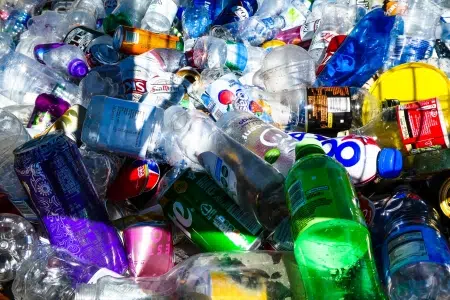According to a recent UK study, more than 1.3 billion tonnes of plastic could enter the environment globally by 2040. Plastic packaging plays a huge part in the world’s use of plastic. To offset the environmental challenges, the Plastic Packaging Tax’s stated aim is to provide incentives to businesses to increase the use of recycled plastic, rather than virgin material, in plastic packaging. But is this the most sustainable choice? And will this really change behaviour? Are there opportunities for sustainable plastics?
Is the use of recycled material in plastic packaging sustainable?

The need for sustainable plastics
From 1 April 2022, the new Plastic Packaging Tax (PPT) takes effect in the UK. It’s a tax that’s going to have a significant impact on organisations across a wide range of industries, from packaging and industrial manufacturing to consumer goods, pharmaceutical and food and drinks.
In fact, the current estimate is that it’s going to affect approximately 20,000 producers and importers of plastic packaging. Furthermore, it’s widely expected that it will also affect business customers of producers and importers of plastic packaging, as well as consumers who buy goods in plastic packaging in the UK. The question to ask is whether incorporating at least 30% recycled plastic in plastic packaging the best sustainable choice – for your people, the planet and your profit?
Sustainability and plastic packaging
However, unlike most taxes, PPT isn’t just something tiresome to prepare for, that’ll cost you more in pennies and people-time. It can represent a chance to reassess your options, make informed sustainable decisions and embrace an opportunity for change. A change that might bring significant benefits to your organisation.
Indeed, besides the obvious one – that reducing plastic is better for the environment – there are many benefits to be gained from reducing your plastic packaging and choosing more sustainable plastics.
Seven key benefits of sustainable plastics
- Cost savings from reducing costs of product storage, handling and disposal and transport
- Time savings to be made that otherwise arise from poorly performing wraps
- Eliminating the use of toxic materials in the production of packaging
- By recycling virgin plastic, your organisation can make financial gains back (receiving £100-£200 per tonne) – more than offsetting the PPT
- Partnerships with local recycling firms to deliver financial – and environmental – benefits
- Positive stakeholder engagement, as you demonstrate your support for change and protecting the environment
- Generally promoting recycling and reuse and sending less packaging to landfill
Start planning now to introduce sustainable plastics to can reduce your tax liability

Benefits of sustainable plastics
The choices you plan today will affect your PPT liability from 1 April. Simply put – by making more sustainable choices, such as recycling more and using less packaging, you will pay less tax. It’s also where we can help at Acopia. We’re currently working with many large and small organisations to help them choose the sustainable packaging and process solutions that are right for their organisation; that can provide real benefits to the environment and to business. To give you an example, these might include:
- Choosing a virgin plastic such as iWrap a high performance pallet wrap which can be recycled and repurposed
- Choosing a lightweight pallet wrap that weighs 50grms and calculates at only 1p tax
So, while, yes, the tax start date is fast approaching, it’s not a deadline to be wary of. If you can try and reframe this taxation, you can grasp an opportunity to make important changes where, ultimately, your organisation and the environment will both benefit.
And one final note. Updates continue to be added to the Plastic Packaging Tax and the government is still responding to queries on its many complexities. For instance, recent changes have been confirmed to the ‘PPT Statement’. So do keep an eye out on changes from HMRC here.
To help you prepare for what the tax will mean for you and how you can benefit, we have created a free eGuide: Is your business prepared for this new taxation?
Download your FREE guide to The Plastic Packaging Tax here
Or get in touch with us using the form below and let’s chat about how Acopia can help you make the best sustainable packaging and process choices that are right for your individual business.
